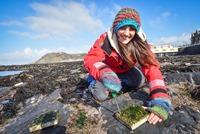IBERS student wins national award for ecological engineering

Ally Evans working on College Rocks in front of Aberystwyth University Old College.
13 March 2015
IBERS PhD student Ally Evans is one of three winners of the P1 Marine Foundation National Student Awards 2014.
The Foundation aims to safeguard and restore the marine and coastal environment by raising awareness through education and effective partnerships.
Ally Evans won the Award for her ground-breaking project ‘ReefCrete: ecological engineering of artificial marine habitats’. Ally’s project focuses on the development of ecological engineering ‘products’, that can be incorporated into new and existing marine developments, using an alternative sustainable concrete material.
The Awards were launched by P1 Marine Foundation in 2012 to reward students in higher education who produce outstanding work that will help protect and conserve the marine environment.
“Ally’s entry was an excellent postgraduate application with a clearly focused multi-disciplinary and practical approach to the project”, said Sabrina Taseer, projects and development manager at P1 Marine Foundation.
“We are delighted that our National Student Awards are giving prominence to exciting and valuable projects of this nature that go beyond research and analysis to develop solutions to environmental problems.”
Ally’s prize-winning project was recognised by the judging panel for its positive and sustainable impact, and for providing a practical solution to some of the threats facing our coasts and seas.
Ally is currently completing a PhD with Dr Pippa Moore in the Marine Ecology research group at IBERS, and is working on this project with Harry Dennis, a recent graduate of the Marine & Freshwater Biology BSc in IBERS.
Together they are trialling novel ‘ecological engineering’ products that can be incorporated into marine construction developments (e.g. sea defences, artificial reefs) to make them better habitats for marine biodiversity.
Ally said: “Increasing development along our coasts and offshore is undoubtedly causing considerable impacts to the marine environment.
We know that manmade habitats are not adequate replacements for the natural habitats they displace, but we also know they can be improved by building-in extra habitat features for marine life. But at the moment, a lot of research in this field uses concrete to make these improvements, which has an extremely large carbon footprint.
ReefCrete is a novel material, using natural fibres and recycled materials, which we are trialling for use in the marine environment instead. It is low-carbon, it recycles waste materials such as whelk shells from the New Quay seafood factory, and our early results suggest it performs well as a habitat for marine life.”
The project is still in its pilot stage, and has been supported by independent specialist cement producers Ecocem Ireland, who provided raw materials for the trials. The prize money of £500 will allow Ally to develop the research over the coming months, when she hopes to establish additional collaborations with engineers and developers for the next stage of the process.
On winning the award, she said “We’re thrilled to have been recognised for this work, especially as it is still in such an early stage of development. It has given us the conviction and the resources to develop it further, and we hope to apply for bigger grant funding later this year.”
The Awards will be presented in London in May, and the ceremony will give Ally an opportunity to showcase her project to an audience of academics, businesses and NGOs.
Judging Panel
Award entries from students at universities and colleges throughout the country were judged by a panel that included Kirsty Schneeberger MBE, an advisor at the Office of the Executive Secretary at UNFCCC, and Dr Trevor Dixon, a Marine Pollution Specialist at Advisory Committee of the Protection of the Sea. The other two winners were from Heriot Watt University
IBERS
The Institute of Biological, Environmental and Rural Sciences (IBERS) is an internationally recognised research and teaching centre providing a unique base for research in response to global challenges such as food security, bioenergy and sustainability, and the impacts of climate change. IBERS scientists conduct basic, strategic and applied research from genes and molecules to organisms and the environment.
IBERS receives strategic research funding of £10.5m from the BBSRC to support long term mission driven research, and is a member of the National Institutes of Bioscience. IBERS also benefits from financial support from the Welsh Government, DEFRA and the European Union.
AU10515



